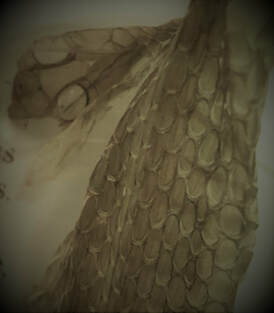
In 2017 I went to a poetry workshop given by Shari Wagner, at the time Indiana’s poet laureate. The workshop promised to focus on nature and help us write a poem to take home. Poetry is way outside my comfort zone, but it sounded creative and challenging.
We started with basic writing guidelines and a heavy dose of encouragement from Wagner. She’d placed objects on a table off to the side, and invited each person to choose one, study it, note how it spoke to us, then write a poem. As I finished taking notes, others jumped up to peruse the objects on the table. Head down, I heard a yelp followed by several shudders of agreement as someone said, “I hate snakes.”
Waiting until the others had chosen objects, I walked over and picked up what had caused the fuss: fragments of a snakeskin. Fragile, smooth, transparent. Scales like windows, weaving, ladder rungs, railroad ties. Growth, movement, a vague memory of what had been living and breathing inside. Immersed in the exploration process, I did not even start a poem. Intrigued by the question, “Why did I choose the snakeskin?” my pen created a web of thoughts not yet ready to be corralled into a poem.
Listening politely as others read their poems, my thoughts still circled around the question. Driving home, I eventually pulled over to write down not an answer, but another question—the first line of a poem:
Why do I so often reach for what makes others recoil?
The stanzas that followed over the next couple of weeks felt forced and clunky but they helped me work through that question a bit. The “finished” poem ended with:
So I lift instead the wispy snakeskin sensing a kindred spirit.
A few days ago as I wrestled with what lies ahead for me in 2019 and beyond in my devotional journal, the first line of the poem came back to me. I unearthed the poem and my workshop notes from a case of old writing hoping for an answer or at least a direction. Instead I simply found fragments of thoughts. But that’s okay—I enjoy the process as much as the final product. The journey as much as the destination.
We started with basic writing guidelines and a heavy dose of encouragement from Wagner. She’d placed objects on a table off to the side, and invited each person to choose one, study it, note how it spoke to us, then write a poem. As I finished taking notes, others jumped up to peruse the objects on the table. Head down, I heard a yelp followed by several shudders of agreement as someone said, “I hate snakes.”
Waiting until the others had chosen objects, I walked over and picked up what had caused the fuss: fragments of a snakeskin. Fragile, smooth, transparent. Scales like windows, weaving, ladder rungs, railroad ties. Growth, movement, a vague memory of what had been living and breathing inside. Immersed in the exploration process, I did not even start a poem. Intrigued by the question, “Why did I choose the snakeskin?” my pen created a web of thoughts not yet ready to be corralled into a poem.
Listening politely as others read their poems, my thoughts still circled around the question. Driving home, I eventually pulled over to write down not an answer, but another question—the first line of a poem:
Why do I so often reach for what makes others recoil?
The stanzas that followed over the next couple of weeks felt forced and clunky but they helped me work through that question a bit. The “finished” poem ended with:
So I lift instead the wispy snakeskin sensing a kindred spirit.
A few days ago as I wrestled with what lies ahead for me in 2019 and beyond in my devotional journal, the first line of the poem came back to me. I unearthed the poem and my workshop notes from a case of old writing hoping for an answer or at least a direction. Instead I simply found fragments of thoughts. But that’s okay—I enjoy the process as much as the final product. The journey as much as the destination.
Your life is a journey you must travel with a deep consciousness of God.
1 Peter 1:17-21 The Message
1 Peter 1:17-21 The Message
 RSS Feed
RSS Feed